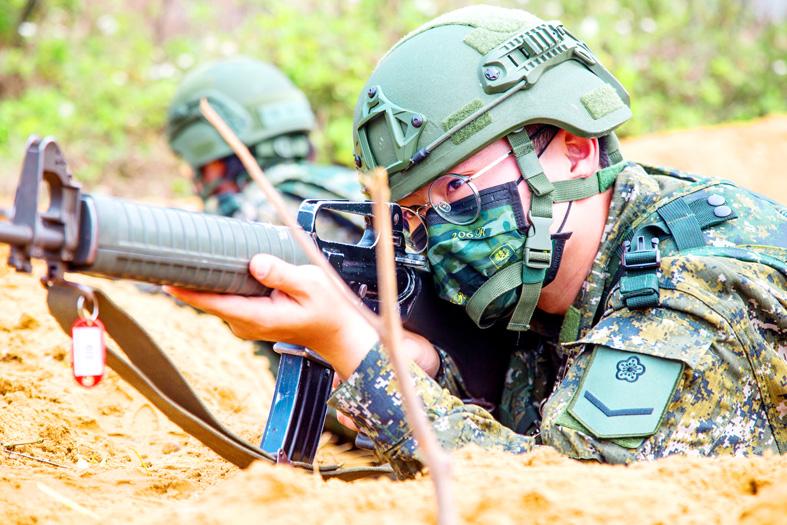More than half of Taiwanese are confident in the nation’s self-defense capabilities, and about 73 percent are willing to fight in the event of war, a poll in the latest edition of the Defense Security Journal found.
The poll in the Institute for National Defense and Security Research’s (INDSR) biweekly journal was part of an article by INDSR researcher Lee Kuan-chen (李冠成), in which Lee said that Taiwan’s resolve to defend itself has never wavered.
While the March poll found that about 73 percent of Taiwanese would fight for their nation in the event of a Chinese invasion, a similar poll in September last year found that about 75 percent would.

Photo: Military News Agency
In the September poll, about 58 percent of the respondents expressed confidence in the military’s self-defense capabilities, while the figure dropped to about 54 percent in the March poll.
While there was a dip in respondents’ confidence, it was within the poll’s margin of error, the report said, adding the March results indicated Russia’s war in Ukraine has not dampened Taiwanese’s determination to defend their nation.
The public’s positive response to the military’s most recent reservist training program and growing support for extending the mandatory service period was also high, demonstrating that people are resolved to defend their country, Lee said.
The greatest impact the Ukraine war had was on the public’s belief that the US would send troops to help defend Taiwan, Lee said.
About 57 percent of respondents in the September poll answered “certainly” or “maybe” in response to the question: “Will the US send troops to help Taiwan in the event of a war across the Taiwan Strait?” That figure dropped to 40 percent in the March poll.
Lee said that this indicates a more reserved attitude toward the possibility of assistance from friendly nations.
The survey showed that, under the condition that the US would send troops to help Taiwan, about 95 percent of those who are confident in the nation’s defensive capabilities would be willing to fight, whereas among those who expressed a lack of confidence in the military’s self-defense capabilities, only 65 percent would fight.
Under the condition that the US would not send troops to help Taiwan, about 89.8 percent of those confident in the nation’s self-defense capabilities would fight for their nation, while 60 percent of those lacking confidence would fight.
Lee’s study showed that regardless of US military assistance, believing in Taiwan’s military capabilities correlates with a willingness to fight for the nation.
Lee said that confidence in Taiwan’s military is crucial in influencing the public’s spirit of resistence.
The March poll was conducted by National Chengchi University from March 9 to 13, targeting individuals aged 20 or older.
The poll received 1,080 valid samples, with 756 interviews conducted via landline and 324 via cellphones, and has a margin of error of 2.98 percent, with a 95 percent level of confidence.

INVESTIGATION: The case is the latest instance of a DPP figure being implicated in an espionage network accused of allegedly leaking information to Chinese intelligence Democratic Progressive Party (DPP) member Ho Jen-chieh (何仁傑) was detained and held incommunicado yesterday on suspicion of spying for China during his tenure as assistant to then-minister of foreign affairs Joseph Wu (吳釗燮). The Taipei District Prosecutors’ Office said Ho was implicated during its investigation into alleged spying activities by former Presidential Office consultant Wu Shang-yu (吳尚雨). Prosecutors said there is reason to believe Ho breached the National Security Act (國家安全法) by leaking classified Ministry of Foreign Affairs information to Chinese intelligence. Following interrogation, prosecutors petitioned the Taipei District Court to detain Ho, citing concerns over potential collusion or tampering of evidence. The

Seventy percent of middle and elementary schools now conduct English classes entirely in English, the Ministry of Education said, as it encourages schools nationwide to adopt this practice Minister of Education (MOE) Cheng Ying-yao (鄭英耀) is scheduled to present a report on the government’s bilingual education policy to the Legislative Yuan’s Education and Culture Committee today. The report would outline strategies aimed at expanding access to education, reducing regional disparities and improving talent cultivation. Implementation of bilingual education policies has varied across local governments, occasionally drawing public criticism. For example, some schools have required teachers of non-English subjects to pass English proficiency

‘FORM OF PROTEST’: The German Institute Taipei said it was ‘shocked’ to see Nazi symbolism used in connection with political aims as it condemned the incident Sung Chien-liang (宋建樑), who led efforts to recall Democratic Progressive Party (DPP) Legislator Lee Kun-cheng (李坤城), was released on bail of NT$80,000 yesterday amid an outcry over a Nazi armband he wore to questioning the night before. Sung arrived at the New Taipei City District Prosecutors’ Office for questioning in a recall petition forgery case on Tuesday night wearing a red armband bearing a swastika, carrying a copy of Adolf Hitler’s Mein Kampf and giving a Nazi salute. Sung left the building at 1:15am without the armband and apparently covering the book with a coat. This is a serious international scandal and Chinese

NEGOTIATIONS: The US response to the countermeasures and plans Taiwan presented has been positive, including boosting procurement and investment, the president said Taiwan is included in the first group for trade negotiations with the US, President William Lai (賴清德) said yesterday, as he seeks to shield Taiwanese exporters from a 32 percent tariff. In Washington, US Trade Representative Jamieson Greer said in an interview on Fox News on Thursday that he would speak to his Taiwanese and Israeli counterparts yesterday about tariffs after holding a long discussion with the Vietnamese earlier. US President Donald Trump on Wednesday postponed punishing levies on multiple trade partners, including Taiwan, for three months after trillions of US dollars were wiped off global markets. He has maintained a 10 percent